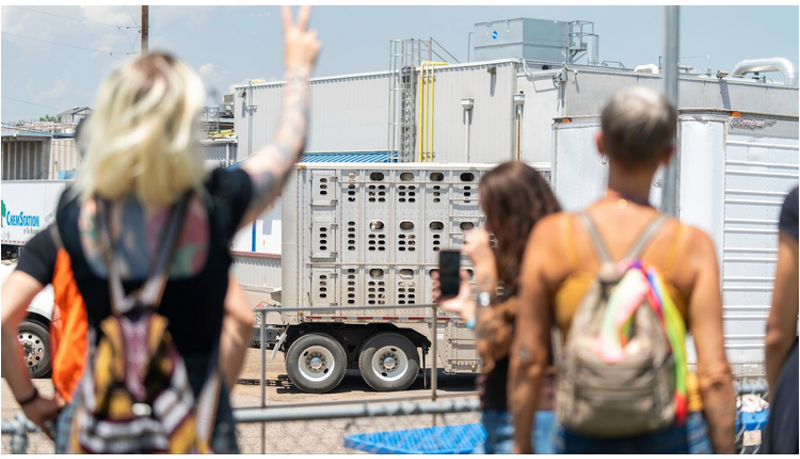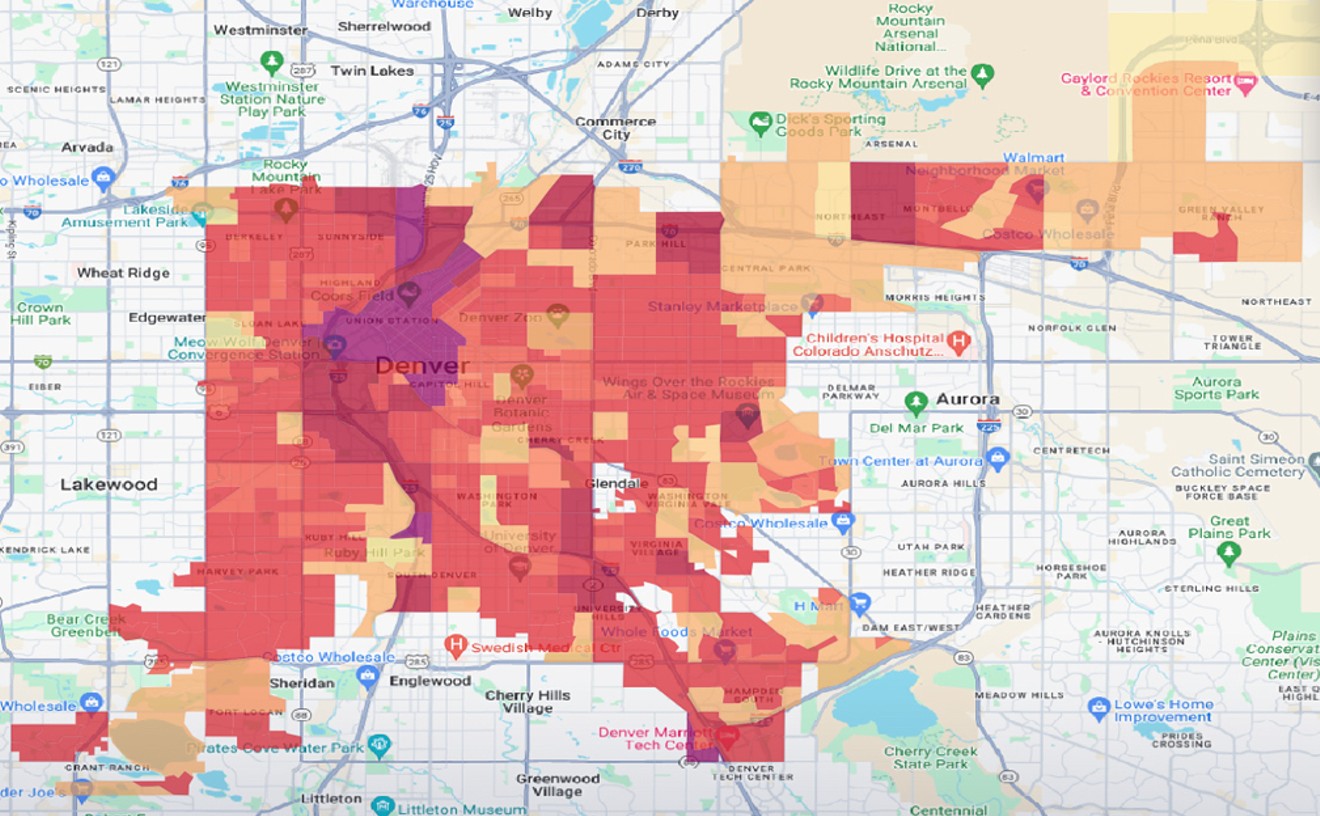On a blistering-hot Wednesday in June, community members walked toward an 18-wheeler that had just arrived at Superior Farms, a lamb slaughterhouse in Denver. A few dozen individuals stood on the South Platte River trail, bearing witness to the animals visible through the ventilation holes on the truck. The baby lambs in the truck, no older than five months, made loud bleating sounds and pawed at the floor in anxiety. As lambs came out of the truck, about to be forced to their deaths, local citizens held each other in grief and sorrow. A good friend of mine was one of the pro-animal supporters who attended this peaceful protest, as well as a vigil at which they laid out flowers in memory of the more than 1,000 baby lambs killed at Superior Farms every single day.
Human onlookers at the vigil attested to feelings of loss and despair, but it was also the lambs’ pain they were feeling. Sheep and other animals are individuals with emotionally rich lives. Mother sheep cry for their babies. In their 2019 report "Sheep Complexity," Lori Marino and Debra Merskin report, “Based on their responses to various situations that would trigger an emotional response in humans… sheep seem able to experience a wide range of emotions, including fear, anger, rage, despair, boredom, disgust, and happiness.” So when people tear up from watching slaughterhouse footage — or from going to a vigil — we should listen to the grief that we feel. Feeling sad for animals’ suffering makes us compassionate people. It’s time we build a better future for both ourselves and the billions of animals who are harmed by our outdated food system.
Bearing witness to victims of slaughterhouses, and joining them in their grief, is a powerful step. But ultimately, we wanted to work toward a solution. That’s why I have joined a group of volunteers and voters working to ban slaughterhouses in Denver. Individuals with Pro-Animal Future are gathering signatures for a ballot initiative that would do precisely that, as part of a larger effort to evolve away from harming animals for food. My friends and I aim to aid in community health, bring about animal freedom and establish environmentally just spaces. Our work is filled with optimism and rooted in empathy. Yes, giving up meat will be an adjustment as our cultures and economies adapt, but we don’t have to do it all at once: It will be a gradual process if we all take baby steps together. If you feel a little grief about the idea of animals’ flesh being replaced, you’re not alone and your feelings are valid. But for animals, who face poor conditions and terrifying slaughter every day, the situation is urgent. In this age of innovative meat alternatives as well as traditional plant food galore, we recognize that leaving slaughter behind will create a kinder economy for all.
Environmentally, there is cause for concern in the Globeville neighborhood, which houses Denver’s slaughterhouse. The foul stench from the kill floor reaches beyond the walls of Superior Farms slaughterhouse and permeates the surrounding streets and homes. As a resident of the neighborhood shared: “There is the smell of death in the air around the Superior Farms slaughterhouse. When I see the lambs brought in on the transport trucks, it hurts my heart. I hear them cry and see their baby faces sticking out of the transport holes as they scream for someone to save them.”
Water pollution is another concern. According to the EPA’s file on Superior Farms, the slaughterhouse has been non-compliant with the Clean Water Act for three years now. Community health goes hand in hand with environmental justice, because while slaughterhouses are bad for the immediate surrounding neighborhood, industrial animal farming is a top contributor to global climate change. Climate-related grief and eco-anxiety could become more common around the world.
"You will not be forgotten." Phrases like this can foster meaning and hope where loss is imminent, whether it be a fellow human we are losing, a dog or cat we have loved for years, a stable climate, or even an unknown sheep whom we know deserved so much better. Studies show that “sheep possess highly acute forms of spatial, social and emotional intelligence, and they are very far from being faceless, insensitive or unthinking towards each other.” Sheep are empathetic, and that leaves us wondering what the lambs felt when they might have recognized the faces of humans they depended on for care and the sensitivity they might have for those standing with them in fear in the truck. The lessons that animals may teach us, even in great despair and loss scenarios, could be a transformative shift.
It’s essential to recognize that the animals killed in slaughterhouses are not just passive victims. Animals try to fight back against the violence that is forced upon them, and sometimes they successfully escape. In March, a calf escaped from a slaughterhouse and ran in fear through the streets of Brooklyn before she found refuge at Skylands Animal Sanctuary and Rescue. Some stories are highlighted in the media, and we may find ourselves cheering on whoever escaped and those who found moments of freedom. While some stories of animal resistance end in sorrow, others find refuge at sanctuaries, and it gives hope to those who understand their desire for freedom. As community members bore witness at Superior Farms, we felt connected to the lambs and each other by the grief and loss we share, but also by the hope that can be present in all of us.
No matter how our grief manifests, whether it’s for the health of our community, the wildlife who share our environment or for the animals caught up in the food system, we should listen to those feelings. Together we have the power to transform these spaces for the better. I invite you to check out the Pro-Animal Future website to read more information on the ballot initiative and learn how you can join other local citizens in our work to ban slaughterhouses in Denver.
Phoenix Huber is a writer and meditator who campaigns with Pro-Animal Future.
Westword.com frequently publishes commentaries and essays on matters of interest to the community. Have one you'd like to submit? Send it to [email protected], where you can also comment on this piece.
[
{
"name": "Air - MediumRectangle - Inline Content - Mobile Display Size",
"component": "12017618",
"insertPoint": "2",
"requiredCountToDisplay": "2",
"watchElement": ".fdn-content-body",
"astAdList": [
{
"adType": "rectangle",
"displayTargets": "mobile"
}
]
},{
"name": "Editor Picks",
"component": "17242653",
"insertPoint": "4",
"requiredCountToDisplay": "1",
"watchElement": ".fdn-content-body",
"astAdList": [
{
"adType": "rectangle",
"displayTargets": "desktop|tablet"
},{
"adType": "rectangle",
"displayTargets": "desktop|tablet|mobile"
}
]
},{
"name": "Inline Links",
"component": "18838239",
"insertPoint": "8th",
"startingPoint": 8,
"requiredCountToDisplay": "7",
"maxInsertions": 25
},{
"name": "Air - MediumRectangle - Combo - Inline Content",
"component": "17261320",
"insertPoint": "8th",
"startingPoint": 8,
"requiredCountToDisplay": "7",
"maxInsertions": 25,
"watchElement": ".fdn-content-body",
"astAdList": [
{
"adType": "rectangle",
"displayTargets": "desktop|tablet"
},{
"adType": "rectangle",
"displayTargets": "desktop|tablet|mobile"
}
]
},{
"name": "Inline Links",
"component": "18838239",
"insertPoint": "8th",
"startingPoint": 12,
"requiredCountToDisplay": "11",
"maxInsertions": 25
},{
"name": "Air - Leaderboard Tower - Combo - Inline Content",
"component": "17261321",
"insertPoint": "8th",
"startingPoint": 12,
"requiredCountToDisplay": "11",
"maxInsertions": 25,
"watchElement": ".fdn-content-body",
"astAdList": [
{
"adType": "leaderboardInlineContent",
"displayTargets": "desktop|tablet"
},{
"adType": "tower",
"displayTargets": "mobile"
}
]
}
]











